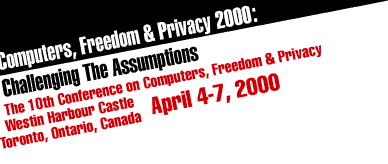Neal
Stephenson is
author of Cryptonomicon, the cyberpunk classic Snow Crash, the
Hugo Award-winning The Diamond Age, and Zodiac: The Eco Thriller.
He has written for Wired and is one of three authors ever to write a
fiction piece for Time magazine. Stephenson is one of six visiting
fellows at Ernst & Young’s Center for Business Innovation in Cambridge,
Massachusetts. He has an almost prophetic vision of the future and a cult
following among high-tech thinkers. Growing up in Champaign-Urbana, Illinois
and Ames, Iowa, Stephenson decided he never wanted to work in an occupation
that forced him to wear hard shoes. In this vein, he began college as physics
major at Boston University. Stephenson was lured to study geography because
that department had better computers. A capable programmer and acclaimed
writer, he finds it hard to work unless he’s listening to music on headphones.
Since 1984, he has lived mostly in the Pacific Northwest and has made a living
out of writing novels and the occasional magazine article. Currently he makes
his home in the Seattle area with his family.
Austin
Hill is
co-founder and president of Zero-Knowledge Systems, Inc., a leading developer of
Internet privacy technologies. A frequent lecturer on privacy and security, he
has spoken at international venues including COMDEX, Internet World, ISPCON and
the 21st International Conference on Privacy and Personal Data Protection. An
authority on privacy-related legislative and policy issues, Mr. Hill recently
addressed the Federal Trade Commission on the subject of children’s online
privacy. He has been quoted or profiled in leading publications including the Los
Angeles Times, the New York Times, USA Today, BusinessWeek,
Red Herring, Time and Wired magazine. Mr. Hill has built
three Internet companies from the ground up – beginning with his first at age
17. Before co-founding Zero-Knowledge Systems, Inc., Mr. Hill was founder and
president of Infobahn Online Services, which merged to form TotalNet, one of
Canada’s most successful Internet companies to date. Prior to TotalNet, he
created Cyberspace Data Security, an early network security consulting firm.
Duncan
Campbell is
a freelance investigative journalist and TV producer. In 1976, he revealed the
existence and nature of GCHQ (Government Communications Headquarters), the
British counterpart of NSA. In 1980, he revealed the existence and nature
of the world’s largest electronic spy base at Menwith Hill, Yorkshire, England,
as well as the location, existence and capabilities of the British government
telephone tapping centre known as Tinkerbell. In 1987, he produced a program
revealing the secret plans to construct and launch the first ever British
electronic listening satellite, codenamed Zircon. In 1988, he revealed for
the first time the ECHELON project, also known as Project P415, for the
widespread global automation and enlargement of the spying system on civil
international communications. In 1999, as a consultant to the European
Parliament, he produced a report containing the first documentary evidence for continued
existence of the ECHELON system, and providing an appraisal of its
capabilities.
Whitfield Diffie, who
is best known for his 1975 discovery of the concept of public key cryptography,
has occupied the position of Distinguished Engineer at Sun Microsystems Inc. since
1991. Prior to this, he was Manager of Secure Systems Research at Northern
Telecom, a position he had held since 1978. Diffie is a graduate in
mathematics of MIT and Dr. techn. sci. (hc) of the ETH in Zurich. Since 1993,
Diffie has worked largely on public policy aspects of cryptography. His
position – in opposition to limitations on the business and personal use of
cryptography – has been the subject of articles in the New York Times Magazine,
Wired, Omni, and Discover and has been the subject of
programs on the Discovery Channel, Equinox TV in Britain, and the Japanese TV
network NHK. Diffie is the author, jointly with Susan Landau, of the book Privacy
on the Line: the Politics of Wiretapping and Encryption.
Steve
Talbott is
editor of the highly respected online newsletter, NetFuture – Technology and
Human Responsibility. He is also author of The Future Does Not
Compute: Transcending the Machines in Our Midst. The library journal, Choice,
selected this book for its annual list of the “Outstanding Academic Books” of
the year. Unix Review named it one of the “Best Books of 1995.”
Talbott is a senior researcher at The Nature Institute in Ghent, New York,
where he explores the social, historical, and philosophical foundations of
science and technology. In his frequent appearances as a public speaker, he
addresses how modern technologies challenge us as individuals and as a society.
Home |
Participation |
Register |
Program |
Accommodations |
Transportation |
Program Committee |
Sponsors |
About Toronto |
Credits |
Privacy Policy


